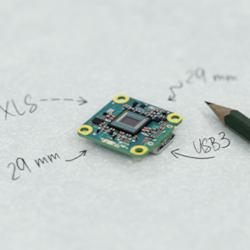Suspension systems in agricultural machinery for comfort and sustainability in the workplace
The Swabian hydraulics specialist WEBER-HYDRAULIK will be represented with an exhibition stand that highlights WEBER-HYDRAULIK’s strong commitment to sustainability and shows how its hydraulic solutions contribute to more sustainability in practice. A particular focus will be on axle and cab suspension systems for agricultural machinery.
Güglingen, 18 October 2023. The world's leading trade fair for agricultural machinery will be held in Hanover, Germany, from 12 to 18 November. Agritechnica has chosen "Green Productivity" as this year's guiding theme. The Swabian hydraulics specialist WEBER-HYDRAULIK will be represented with an exhibition stand that highlights WEBER-HYDRAULIK's strong commitment to sustainability and shows how its hydraulic solutions contribute to more sustainability in practice. A particular focus will be on axle and cab suspension systems for agricultural machinery.
Agricultural machinery is one of the largest segments in WEBER-HYDRAULIK's portfolio - and it continues to grow. Hydraulic systems are used not only in tractors but also in implements such as ploughs, baling presses and harvesters. However, vibration damping systems are particularly beneficial in tractors. As the workplace of farmers, tractors and agricultural machinery are subject to occupational health and safety regulations to prevent health problems. Prolonged exposure to excessive vibration can lead to poor circulation in the arms, back pain and - in the worst cases - spinal damage. Good suspension is therefore essential for healthy and effective working conditions, while also increasing productivity: The more comfortable and vibration-free the driver's seat, the longer the driver can concentrate on the job without getting fatigued. This also helps minimise fatigue-related driving errors.
What is true for people is also true for machines: Good suspension means less wear and tear, which reduces material and repair costs. This extends vehicle service life and saves costs and resources in the long run. However, too much suspension is counterproductive, because when all vibration is neutralised, it is easy to lose the feeling for the loads to which the vehicle is subjected. This would cancel out the actual preventive benefit of good suspension for the durability of machine parts.
Comfort and efficiency
The main suspension systems in agricultural machinery are front axle and cab suspension. In addition to protecting people, machines and the environment, both systems also have economic benefits. With less vibration for drivers, driving speeds can be increased both in the field and on the road. At higher speeds, travel time is reduced and manoeuvrability is improved. For example, this can speed up the process of tilling a field. In addition to improved ride quality, especially during long days in the field, the benefits of good axle and cab suspension also include increased stability and traction. When pulling heavy agricultural equipment or working on slopes, this type of suspension provides superior stability and control over the tractor and the trailer. Traction is also ensured by the improved adaptability to terrain conditions. This is a particularly important aspect in agriculture, where machines must adapt to varying soil and weather conditions.
Increased resale value is another benefit of comprehensive axle and cab suspension that should not be overlooked. Agricultural machines equipped with state-of-the-art suspension technology are popular choices on the used vehicle market because of their efficiency, safety and longevity. This guarantees a high resale value and reduces losses for farmers. As a result, suspension technology plays a significant role in making tractors a worthwhile investment in agricultural operations.
One-stop research and development, testing and production
Vibration damping systems and hydropneumatic axle suspensions consist of several components: the hydraulic cylinder, the valve block, the valves, the controller (ECU) and the software. A unique selling proposition: From product development to testing and production, all components are manufactured in-house at WEBER-HYDRAULIK. A one-stop solution combining perfectly matched components. A win-win for both manufacturers and customers.
About WEBER-HYDRAULIK GMBH
WEBER-HYDRAULIK GMBH is a leading international specialist for customized and functionally reliable hydraulic solutions. Reliable and powerful, the family-owned company from Güglingen has been developing high-quality cylinders, control blocks, steering and suspension systems, valves and power units for mobile machinery, commercial vehicles and machine tools as well as rescue equipment for over 80 years - an unbeatable portfolio of services covering all aspects of movement, power and dynamics. As an innovative business partner, WEBER-HYDRAULIK implements sophisticated, application-specific system solutions according to customer requirements. With almost 1,600 employees at five locations in Germany, Austria and Poland, the hydraulics specialist generates annual sales of approximately 350 million euros.
Featured Product


